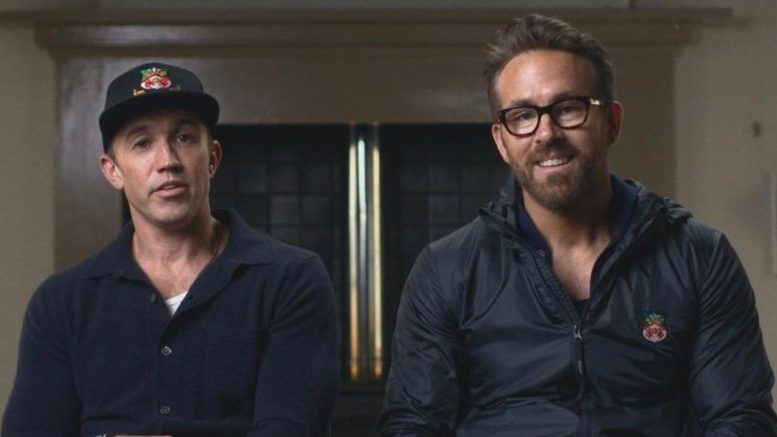The problem with Wrexham becoming such a story within the soccer world, thanks to the efforts of Ryan Reynolds, and Rob McElhenney making them so, is that the suspense is kind of removed from Season 2 of Welcome To Wrexham. We know how this one ends. Wrexham win the National League, and get promoted. Which has been the overall goal for the Hollywood duo’s quest as owners. Whatever happens in the interim, good or bad, it all ends well, and where it needed to. They did their job, or at least the first task of their job.
That doesn’t mean Season 2 can’t have some good stories to tell, and let us in behind the curtain a bit. But McElhenney and Reynolds are still pretty intent on shading what we see behind that curtain that makes them look good, even when it kind of doesn’t.
The first episode of Season 2 opens with Reynolds and McElhenney laying out the stakes of the upcoming 2022-2023 season. And both of them admit that they’ve gone back on what they promised, which was putting Wrexham on stable ground after years, and years of mismanagement that had left the club on the brink of collapse. Instead, they’ve spent lavishly and over their heads to gain promotion, which would make the spending worth it. They describe the threat of not getting promoted as leaving the club, “fucked.”
But there’s a lack of ownership to that. Reynolds and McElhenney act as if that’s just something that happened to them, not a conscious decision that they made to go beyond their means in order to gain promotion. Again, we know it worked out, so it’s always going to be seen in a different light than if we were watching it live. They succeeded. But even if the duo were taking more ownership of that decision and that method for running the club, are we supposed to feel sorry for them? These are two guys richer than we’ll ever be. Sympathy doesn’t run deep, especially when we’re talking about a football club that means a whole lot to a lot of people. If Reynolds and McElhenney didn’t do their due diligence on what it might cost, even at the extreme, to get Wrexham out of the National League, that’s on them.
That continues with the episode’s main theme, which is the pursuit of tearing down, and rebuilding the unused stand, the Kop. To be fair, this isn’t the normal owners trying to bilk governments and taxpayers out of money to build a stadium. The Levelling Up Fund that Wrexham applied to was specifically set up for infrastructure projects that benefit communities. Maybe a football ground isn’t the highest on the list of priorities, but we’ve seen what clubs mean to their towns and cities. It’s on the list. And again, we know that the club eventually got the funds from the Welsh government with some creativity last April.
But still, it feels like Reynolds and McElhenney have all their eggs in this basket, while knowing all the time that the stand would have to be rebuilt. That much was clear when all the viewers saw it on the first episode of the show. Buying the club meant taking that on, and it certainly felt like they didn’t have a plan for this other than the government coming to save the day. Everyone should have known trusting a Tory government was a fool’s errand.
The episode’s other crux is the visit of King Charles III. While a visit of the Royal Family anywhere is usually a pretty big story, the five to ten minutes we spent with Reynolds and McElhenney in Royal Courtesy Class or whatever it was definitely felt superfluous, and celebratory. “Look how hard we’re working in our LA mansion!’ The cover story, that somehow charming King Charles, who barely knows where he is at any given moment, would grease the wheels for the government to provide their funding for the Kop rebuild was laughable. Let’s all picture Charles calling Boris Johnson or Liz Truss — either being a true meeting of the minds — to advocate for a football club in Wales. It also might have been worth a couple minutes to see how the residents feel about the Royal Family, just to provide a juxtaposition.
That doesn’t mean the show didn’t have its strengths. Showing us the rehab of goalkeeper Rob Lainton and the painful monotony of it is something we don’t normally see and probably take for granted as fans. When what he has riding on his return from injury, in that he’s in the last year of his contract, only gives it more weight.
Same goes for the subjects of Season 1 dealing with an unexpected celebrity, such as pub owner Wayne Jones. And the show doesn’t try too hard to present it as only a funny, enriching experience, as Jones and other fans being asked to sign shirts are presented just as confused, and wary of it as entertaining they find it at times. These are not things they asked for, or were expecting, and showing all sides of their new personas is a great example of the very unique world Wrexham finds itself, given the size of the club.
Hopefully, Welcome To Wrexham leans more into that as Season 2 goes on, given we know how the main arc plays out. It still is pointed to make Reynold and McElhenney seem the most charming people in the world, which we already knew they were. But their struggles as owners are only ones they put on themselves, and there was more than their money at stake should it have failed, and for a lot more people who didn’t make any of those decisions. They’re becoming more and more sports owner-ish with every passing month, it seems.
Follow Sam on Twitter @Felsgate and on Bluesky @felsgate.bsky.social
Original source here
#Ryan #Reynolds #Rob #McElhenney #heroes #Wrexham #theyre #villains





